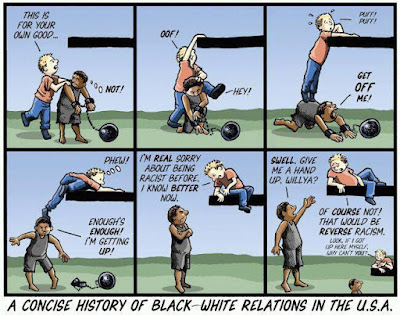Thoughts on Reparations
While one cannot pick sides on the issue of reparations, it is vital to highlight the grounds on which the black leaders demanded reparations. In his speech "God's Judgment of White America," Malcolm comments on repayments owed to the black community living within America. According to him, "after four hundred years of slave labor, we have some back pay coming, a bill owed to us that must be collected." In his other speech, he alludes to the land as the basis of "freedom, justice, and equality," and because the black people are not given their share of the property, they can take it through a revolution. In this way, land can be seen as a form of reparation which is denied by the government. These calls for reparations became an integral part of the civil-rights movement and also appeared in MLK's "I Have a Dream" speech when he mentioned that America gave a "bad check" with "insufficient funds" to the blacks. For MLK, the rationale for reparations goes hand in hand with the notion of economic equality and social justice. The economic inequality stems out of segregation, and perhaps some payback is required for the black community that has spent years under oppression and injustice. This notion turns reparations into a moral burden on the white society. Moreover, they can also be viewed as an essential step towards positive peace that can only prevail when justice is served in the society.
In recent times, it has become a hotly debated topic in American politics. The contemporary leaders raise this issue to address the racial wealth gap, which comes from MLK and Ella Baker's notion of long-term development and peace. But Malcolm and Du Bois think of reparations as a tool to atone for the psychological harm of racism on Black Americans. In his book, Du Bois highlights the plight of the blacks, who can see the world through a veil and develop double consciousness. This double consciousness is the "sense of always looking at one's self through the eyes of the others, measuring one's soul by the tape of the world that looks on in amused contempt and pity." This notion of the split self does not come directly in Malcolm's speeches, but he thinks that Islam can break the mental shackles and make the "negro see and think for himself." In his speech, he continually refers to the Negros who are "mentally" blind and ignorant because of the cruel bondage of four hundred years. Double consciousness and mental blindness often lead to distortions in the way Black Americans view themselves in social setups. It also breeds self-hatred, which is another psychological harm.
The debate about reparations also takes me back to Fanon's book, 'Black Skin White Masks', where towards the end, he makes a case against the reparations. According to him, "I have neither the right nor the duty to claim reparation for the domestication of my ancestors." Perhaps for him, reparations would permanently tie down the black person to his black identity and his past, and take away the possibility of living with complete freedom. He sees himself as a man rather than a negro, and thinks of a society where there is no "negro mission and no white burden." However, he presents a different argument in the 'The Wretched of the Earth' where he claims the "wealth of the imperialist nations is also our wealth," and the western powers owe reparations to the countries they exploited. And the only way newly-established countries can gain back their dignity is by gaining some material compensation from the colonisers. However, his approach in this context might be flawed as giving reparations to previously colonised nations might create a culture of dependency and help the western powers gain dominance over them.

Comments